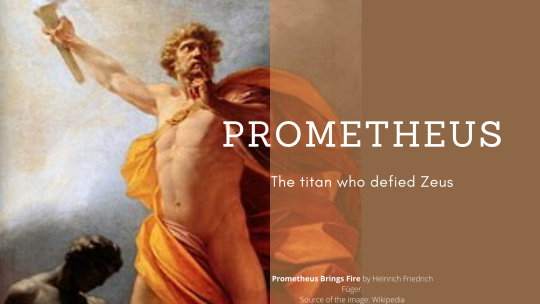Greek mythology: Prometheus, the titan who defied Zeus
Author's note: The following article was published in January 24th, 2021 in Spanish language on my Blurt blog.
Banner created with Canva
In the last post we approached the great divine war that the Titanomachy meant to be, which cause was none other than the repetition of the succession's conflict problem and the fear of being replaced. A war that resulted in the exile of the most of the Titans to Tartarus and the division of the universe between the three main Olympian gods: Zeus, Poseidon and Hades.
Now that teh Titanomachy was over and that the cosmic possessions were distributed, the Olympian gods decided that humans, the Titanides, and two of the three sons of Iapetus (Prometheus and Epimetheus) pay homage to them. They obey ... Or at least that's what it seems.
The theft of fire
Prometheus was disappointed; he had aided Zeus in the Titanomachy because he believed that he would be a ruler fairer than his uncle Cronus. However, he proved to be the same or more tyrannical than his father when he saw how he treated the human beings that Prometheus himself had created (Carramiñana, 1969: 40). It is important to note here that humanity was treated as an equal by the Titans during the Golden Age, so it was likely that Zeus decided to suspend that treatment, since it reminds him of a reign before his own or that he considered humans too inferior to the gods (Willis, 1996: 131).
Hesiod, in his Theogony, points out that Prometheus then decided to wage a subtle war of cunning with Zeus, although he knew the latter had the upper hand because the king of the gods knew everything. This was demonstrated in the conflict of the ox bones, to which men had offered in sacrifice and in which Prometheus devised a stratagem so that men were the ones who could eat the meat while the gods kept the bones.
Such incident infuriated Zeus so much that he decided to punish Prometheus' creation by depriving the m of the fire. However, Prometheus was not idly: in a cunning way, he theft the fire and gave it to the men.
There are two versions related to this last action. In his Theogony, Hesiod explains that he hid the fire in a hollow reed, although he does not explain where he got it from; another version, collected by Roy Willis (1996), indicates that he infiltrated the forge of Hephaestus and obtained the fire, delivering it to the men, whom he instructed in the different arts.
Zeus' reaction was inmediate: he captured Prometheus and chained him to a rock. As a punishment, he imposed that an eagle devour his intestines every day, which would regenerate each night to repeat the cycle. That torture lasted for several millennia until Heracles frees him.
Prometheus, mankind's supreme symbol
Ángela Carramiñana (1969) offer us an interesting but brief comparison between the main versions of the myth of Prometheus: Hesiod's and Aeschylus'. While Hesiod describes him as a cunning and tenacious character endowed with the gift of prophecy, Aeschylus describes him as an individual who seeks to protect his creation at every cost, transforming him into a supreme symbol of mankind and the architect of the civilization.
If we read carefully the versions of both authors, we notice a common point: both use the fire as a symbol of civilization, as the medium in which man is capable of technological and intellectual development. Therefore, this myth could be interpreted as an allegory of the evolution of humanity and how the divine is human at the same time.
Now, what were the consequences of the fire theft for mankind? Hunger, illness, pain, hope. Everything contained in a jug that a certain lady carried, of whom we will talk in the next post.
Cited sources (in Spanish)
- Carramiñana, Ángela. 1969. "Dos versiones del mito de Prometeo: Esquilo y Eugeni D'Ors", en: Boletín del Instituto de Estudios Helénicos, vol. 3, núm. 1, págs. 39 - 42. Extraído de: Página oficial del Boletín del Instituto de Estudios Helénicos.
- Hesíodo. Teogonía. España. Luarna Editorial. Consultado en: Biblioteca electrónica del Municipio de Ataun, País Vasco. English version of this book: Theogony by Hesiod.
- Willis, Roy. 1996. Mitología. Guía ilustrada de los mitos del mundo. Editorial Debate. España / China. English version of this book: World mythology: The illustrated guide.
